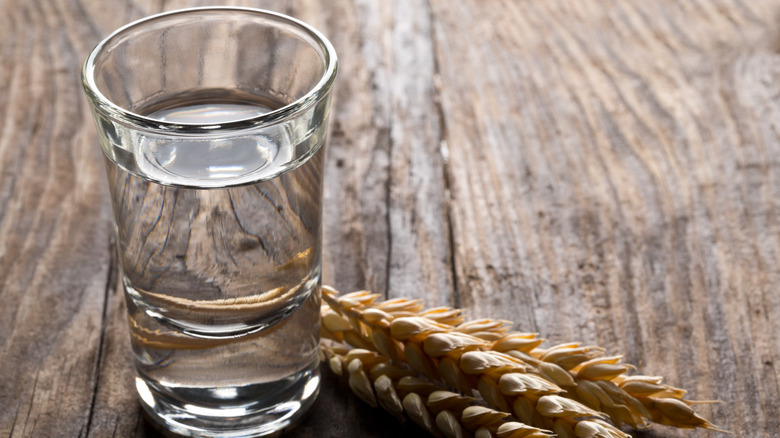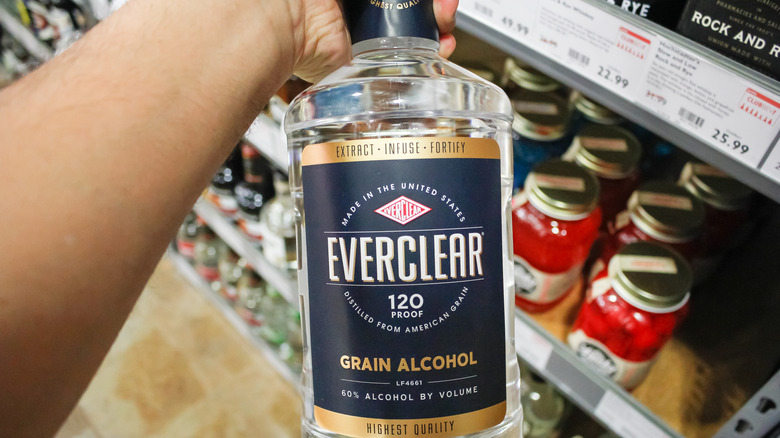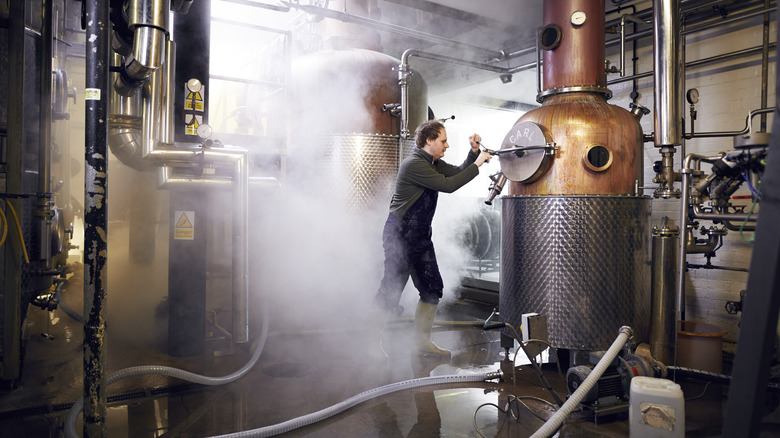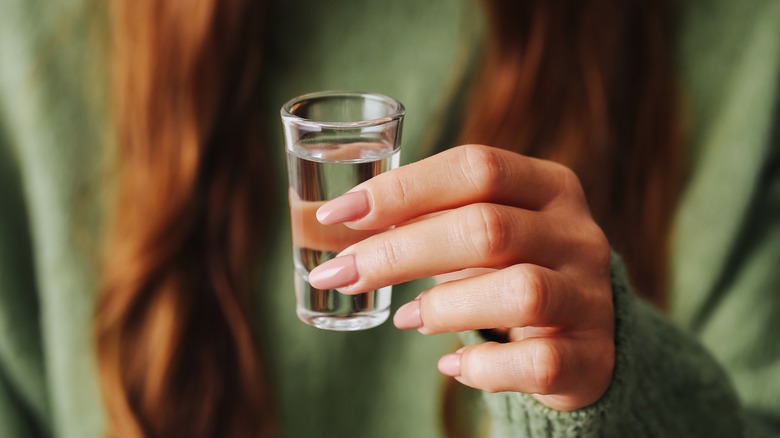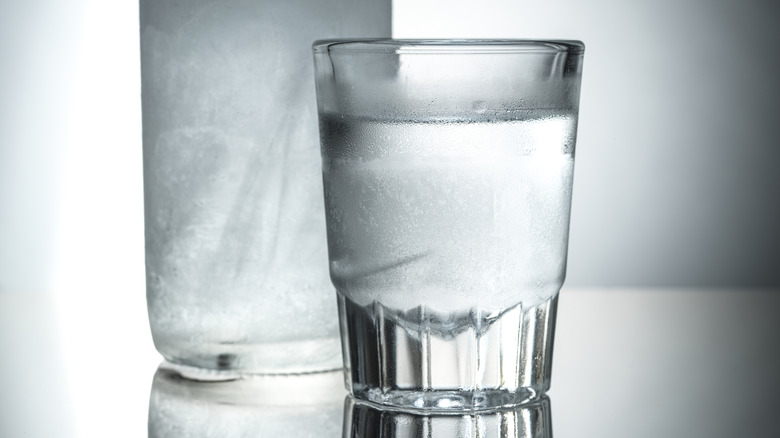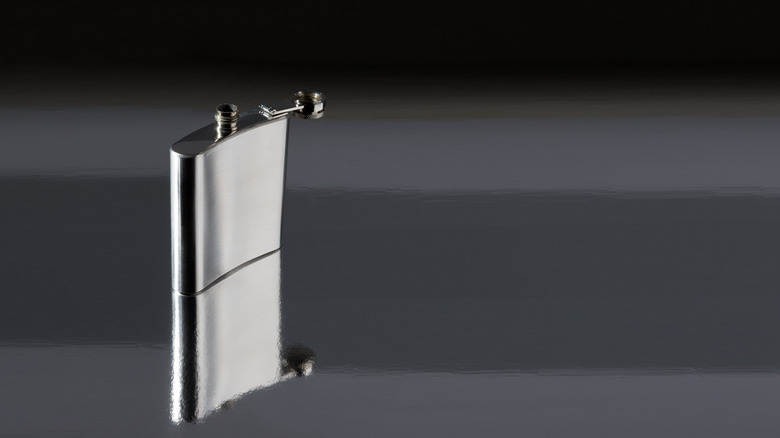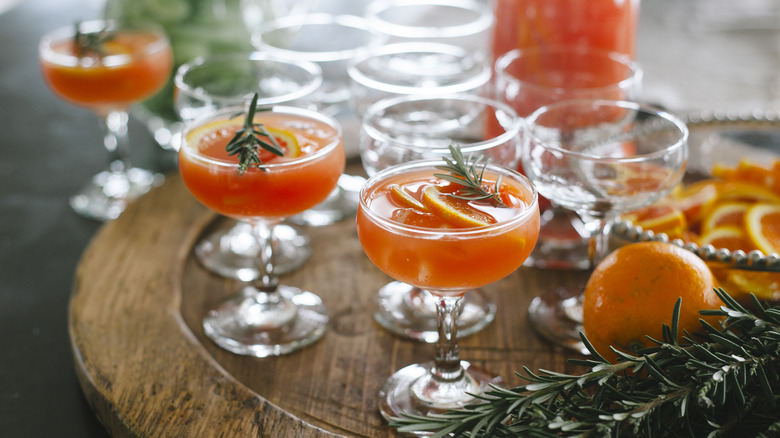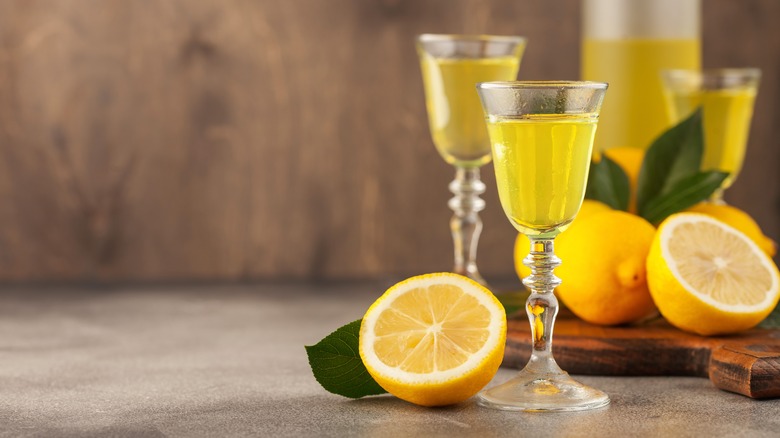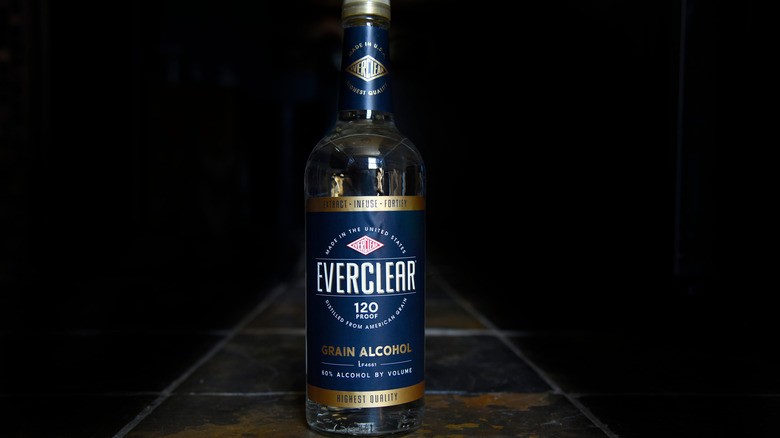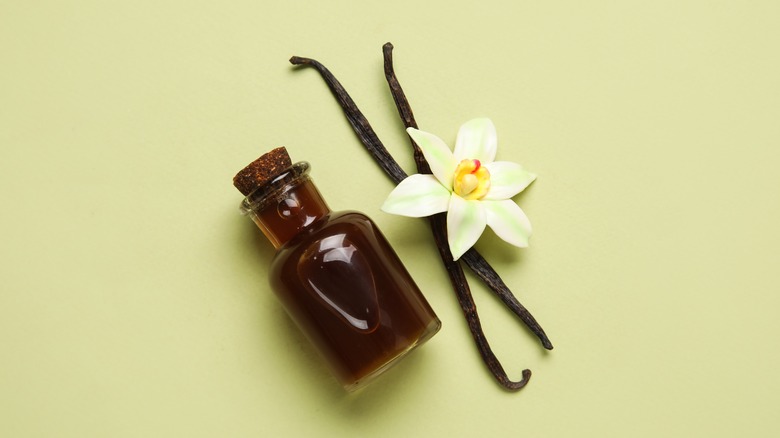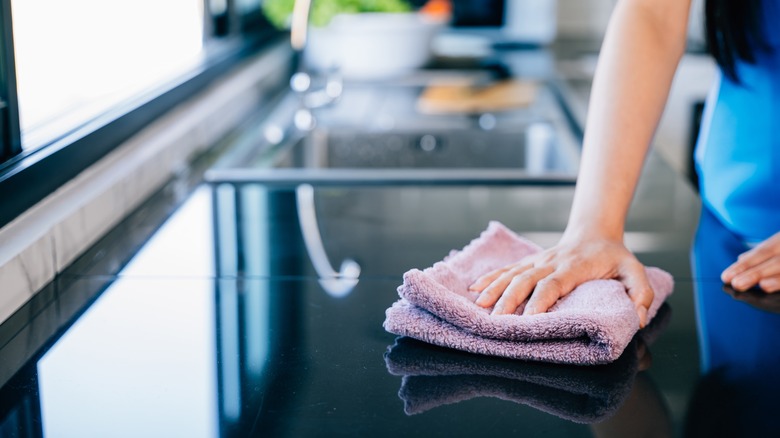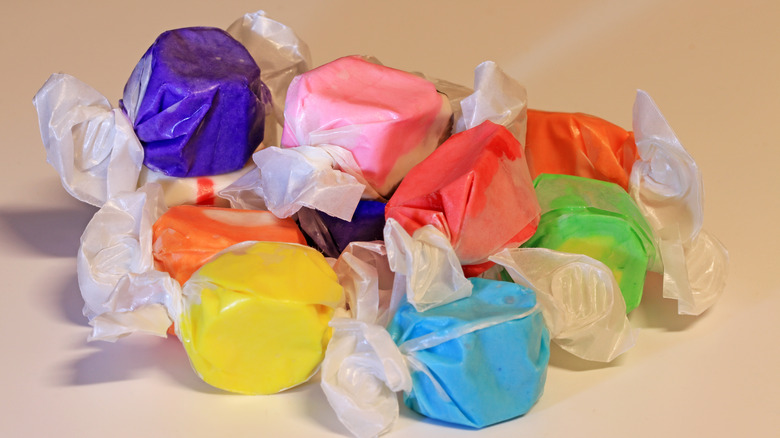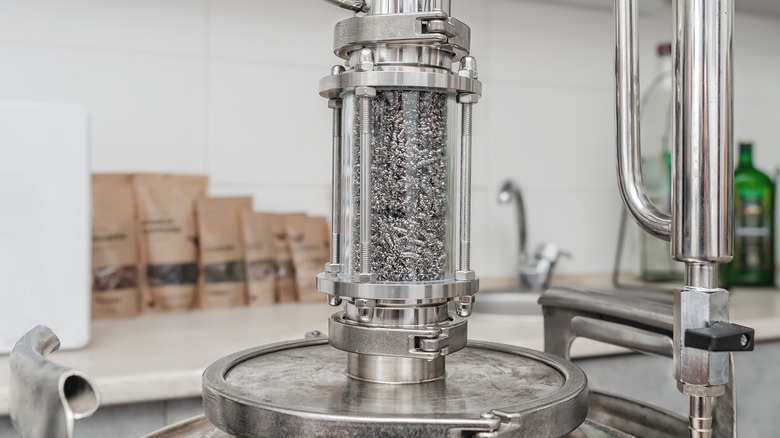What Exactly Is Grain Alcohol And Can You Drink It?
In the world of alcoholic drinks, one option stands tall above the rest: Grain alcohol. Many liquors, like vodka, gin, or whiskey, start with grains, but the term "grain alcohol" has come to refer to something else entirely. This is a subset of super-strength clear liquors with an ABV way above what you'd expect in a standard drink. Grain alcohols are some of the strongest liquors out there today, and what might surprise you is that you can stroll into your local liquor store and pick up a bottle pretty easily. Seems like a good idea, right? Why waste time buying a 40% ABV vodka when you can grab a 95% ABV bottle of Everclear? Well, because drinking grain alcohol is not like drinking other alcohols, that's why.
The immense strength of these liquors is a blessing and a curse, and trying to drink them in the same way that you would another alcohol may cause you some serious harm. To understand why that's the case, we decided to get some experts to weigh in on all things grain alcohol. So we spoke to Billy Busch, founder of the Busch Family Brewing & Distilling Company, and Justin Stiefel, CEO & Master Distiller at Heritage Distilling Company, to get the lowdown.
What is grain alcohol?
It's important to draw the distinction between grain alcohol as a specific type of liquor, and grain alcohol as an entire category of liquors. The name grain alcohol is usually given to spirits like Everclear, which "is a high-proof, pure ethanol distilled from grains such as corn, wheat, or rye," as Billy Busch explains, adding, "It's known for its potency, often reaching 190 proof, which is 95% alcohol by volume." Grain alcohol is distilled to an incredibly intense ABV so that it can then be used to manufacture other drinks. "For many in our industry it is an essential tool in crafting spirits," says Justin Stiefel.
You may also hear grain alcohols referred to as "rectified spirits," with the term rectified essentially referring to their pure, refined state. When an alcohol has such a high ABV, it naturally means that there's less room in it for other things, like water or flavoring compounds. This means that if you drink grain alcohol straight (which we really wouldn't recommend), you'll be getting a pure alcohol flavor. There are plenty of grain alcohols out there that are lower-strength, like whiskies, which van be made from a variety of different grains, but they generally won't be referred to as such. Rather, they exist as a type of liquors made with grains.
Grain alcohol is made through fermentation and distillation
All alcohols are made through the process of fermentation, sometimes followed by distillation. Grain alcohol is no different, distilled to a fierce strength, which means it requires one of the most rigorous operations out there to do it. "Grain alcohol is created through a meticulous process that begins with the base grain and ends with one of the purest forms of ethanol available," explains Justin Stiefel. "At its core, it's a combination of science and precision, that begins with carefully selecting grains — corn, wheat, rye, or barley — which are rich in starches."
These starches are then fermented, slowly creating alcohol. "The fermentation process converts the starches in the grains into sugars, which are then turned into alcohol by yeast," says Billy Busch. "Distillation further purifies the alcohol, removing impurities and increasing its proof to extremely high levels." The distillation process is often not a one-and-done thing, either. Because of the strength of grain alcohol and the need to remove as many impurities as possible, distillation can frequently occur multiple times. Stiefel notes that the final step in the process is to filter the grain alcohol to give it the cleanest flavor profile and scent that it can achieve.
Grain alcohol isn't the same as vodka
Although a lot of people still think that vodka is made from potatoes, the truth is that most mainstream vodkas are instead made from grains. As such, a lot of people conflate grain alcohol and vodka, but the truth is that the two are quite different. "Vodka is also made from grains, but it's distilled to a much lower proof — typically around 80 proof (40% alcohol by volume)," says Billy Busch. "It undergoes filtration to remove impurities and develop a smoother taste, making it drinkable straight or in cocktails. Grain alcohol, on the other hand, is distilled to near-purity and lacks the refinement and flavor of vodka."
However, while vodka and grain alcohol as we know it are different, the latter is essentially used to make the former. "Federal law in the United States requires vodka to be first distilled to 190 proof, and proofed down to bottling proof, usually with some type of filtration process to remove any last flavor impurities," says Justin Stiefel. By starting with a super-strength grain alcohol which is created specifically for the vodka, manufacturers can ensure that their beverage is as clean and odor-free as possible, with no impurities that could sully the drink.
Grain alcohol should have a neutral taste
What does grain alcohol taste like? Nothing. At least, that's how it should taste. "Unlike lower-proof spirits, grain alcohol is almost entirely devoid of flavor, making it a versatile but powerful base for various uses," explains Billy Busch. The reason for this is that when made properly, grain alcohol has barely anything in it but pure ethanol, which may burn your mouth and throat but is basically flavorless.
However, this relies on it being made correctly and cleanly. "If prepared and distilled properly it should be as close to neutral in flavor as possible, coming off the still at 190 proof (95% pure ethanol) with the remaining volume composed of water," says Justin Stiefel. "Depending on the type of preparation and equipment used in the process, some slight hints of residual flavor may be found." This lack of flavor may seem boring, but in manufacturing terms it's essential for cleanly infusing other things into the alcohol. "The goal of the grain alcohol should be to act as the base that doesn't interfere or get in the way of your end for target, whether you are making a flavored vodka, a liqueur, gin or an extract," Stiefel states. If it has a load of other flavors in it, it's just going to cloud the taste of the eventual beverage it makes — and the flavors of these drinks are often full of subtleties already.
Despite its mild flavor, grain alcohol shouldn't be drunk like other spirits
There are a lot of stories out there, of people drinking spirits like Everclear and living to tell the tale, with dangerous social media trends like the Everclear Challenge contributing to them. Despite what folks on the internet may tell you, however, you absolutely should not be drinking grain alcohol straight. "Technically, you can drink grain alcohol straight, but I wouldn't recommend it," says Justin Stiefel. "Grain alcohol at 190-proof gets absorbed through the capillaries in your mouth very quickly, putting the high-proof alcohol into your bloodstream before having a chance to process in the stomach." This, Stiefel notes, can cause rapid intoxication which may lead to potentially dangerous consequences.
Billy Busch is even more clear on the risks of drinking grain alcohol. "At 190 proof, it's nearly pure ethanol, which can cause serious harm to your body, including severe intoxication, damage to your throat and stomach lining, and even alcohol poisoning," he says. Instead, grain alcohol should always be diluted — not least because it's exceptionally unpleasant to drink neat, even aside from the drunkenness it causes.
You can mix grain alcohol into other drinks – but you need to be careful
If you shouldn't drink grain alcohol neat, and if it's so dangerous, then you may wonder why it's sold in stores in the first place. One big reason is that grain alcohol can be used like other liquors to mix into drinks. "Grain alcohol is commonly used as a base for punches, liqueurs, or infused spirits due to its neutral flavor and high strength," states Billy Busch. Justin Stiefel also points out that it can be used in large batched cocktails.
However, when using grain alcohol as a spirit in mixed drinks, you need to be extremely careful. "Grain alcohol is so high proof that it can easily overpower anything you mix it with, and it's also a lot more potent than most spirits people are used to," says Stiefel. This all means you need to dilute it heavily — much more than you would with a liquor like vodka or gin. "The two most important rules when dealing with 190 proof grain alcohol for cocktails are: 1) be intentional with your plan on how to use it; and 2) make sure you double check your recipe and ratios so that you are not over-serving unsuspecting guests," advises Stiefel. Even a little too much can ruin your drink, and have your guests way drunker than you likely intended.
Grain alcohol is a common ingredient in homemade limoncello
Grain alcohol isn't just for pouring into punch bowls and making super-strength cocktails: It can also be used to make your own liqueurs at home. "Many recipes for home-made limoncello or liqueurs require [190-proof] neutral spirits as the base. The lack of flavor in the high-proof ethanol allows your target flavors to shine through," says Justin Stiefel. A good way to make limoncello is to take a clear grain alcohol and soak lemon peel in it for a couple of weeks. This gives the alcohol a richly lemony flavor, as the oils in the peel infuse with the spirit. The bold concoction is then watered down, with lemon juice and sugar added for further flavor.
The process for making homemade liqueurs like limoncello is delightfully simple but, as with any use of grain alcohol, you have to ensure that it's diluted sufficiently. "Most liqueurs and limoncellos are bottled between 24% ABV and 32% ABV," says Stiefel. "This means if you start with a 95% ABV base alcohol, you need to dilute it nearly 3- or 4- to 1 with water or juices to get the final ABV down."
When buying grain alcohol, look out for reputable brands
Grain alcohol has a slightly unfortunate reputation. A lot of people feel that its high strength makes it comparable to moonshine, and that it's somehow going to be harmful or toxic. Provided that it's made by a known seller, though, that won't be the case. Sure, if you drink too much of it or drink it neat you may well be in harm's way, but that will be because how much alcohol you're consuming, not anything else in the drink.
If you're buying grain alcohol, you should look for reputable brands. "Everclear is undoubtedly the most recognized brand of grain alcohol, known for its consistent quality and potency," recommends Billy Busch. "Other options include Graves Grain Alcohol and Luxco's Clear Spring." Justin Stiefel also recommends High Proof by Artisan Distilling and Sinclair-brand grain alcohol. It's worth remembering, too, that Everclear comes in several different strengths. While its 190-proof option is arguably the best-known (and obviously the most potent), it also has some weaker formulations that may be more suitable to your uses. Watch out for fake products that look like the real thing, too: Alcohol counterfeiting can be a real problem and may lead to you drinking an impure counterfeit beverage, so always buy grain alcohol from a store you trust.
Grain alcohol can be used for cooking
Grain alcohol isn't just for drinking: It can also be used in the kitchen. It can be used just like vodka or rum to flambé dishes, infusing them with a smoky, caramelized taste. Its high alcohol content means that it burns easily — but this can be a problem. "Since it's so high-proof it can easily get out of hand in the kitchen, leading to the risk of a significant kitchen fire," says Justin Stiefel. Billy Busch agrees, pointing out that you need to nail your timings and technique, or consider watering down your grain alcohol.
Grain alcohol can also be used in cooking without heating it up. "One of the most popular uses for grain alcohol is making homemade extracts, like vanilla extract or herb infusions," Steifel says. "Its high alcohol content helps pull out the flavors from the ingredients, giving you a pure, concentrated extract that's great for baking or cooking." Doing this is often as simple as leaving your herbs or spices to steep and infuse inside the grain alcohol. However, you may need to dilute it slightly if doing this. Vanilla extract, for example, is typically around 35% ABV, and you run the risk of making your food surprisingly alcoholic if you add straight, infused grain alcohol to things. On top of all this, some people think making your own vanilla extract is a waste of time, so it may be better to just buy it.
There are plenty of other uses for grain alcohol
Grain alcohol's extreme strength gives it a surprising amount of versatility. Billy Busch points out that this high-ABV alcohol can be used for various different things that are completely unrelated to drinking. "It's often used as a disinfectant or sanitizer, especially in high-proof forms, and can serve as a base for homemade tinctures, extracts, or cleaning products. Its versatility makes it a popular choice for DIY projects and household uses."
Justin Stiefel notes that grain alcohol is especially good for cleaning glass or metal items, and it can help to give these a really good shine. As ever, though, just make sure you're watering down your grain alcohol when using it. Its high strength can damage the surfaces of the items you're cleaning, or irritate your skin.
Speaking of irritation, grain alcohol can also have medicinal uses. "It can also serve as a strong antiseptic for wounds or cleaning small medical instruments, though you'd want to be cautious about using something so strong directly on your skin," says Stiefel, "It's typically diluted for medical uses." You should dilute it too if you're using it to treat cuts or abrasions, and be ready for it to sting!
Grain alcohol may already be in your food
You may have already tried grain alcohol without even knowing it — at least a tiny amount of it, that is. Grain alcohol is commonly used as a root ingredient for liquors and liqueurs, but it can also be in foodstuffs where you may not expect it. "Many food manufacturing processes use grain alcohol," says Justin Stiefel. "For example, when caramels are made in large volume facilities, a light mist of alcohol is sprayed on the wax paper, making it easier for you to unwrap the treat without sticking." Luckily, though, it isn't used in high enough quantities for you to get drunk, or even taste it for that matter.
Ethanol itself may also be used in various foods, like sauces, syrups, candies, and cake ingredients. While homemade options are more likely to use vodka, brandy, or another liquor, industrial versions may opt for grain alcohol for its purity. Grain alcohol or ethanol may also be a base ingredient in food additives and food colorings. As with its use on candy wrappers, though, these ingredients are used in such small amounts that they won't cause intoxication if you ingest them.
No, you shouldn't make grain alcohol at home
Making grain alcohol can feel like a good project, especially for those folks out there who are scientifically minded. However, we'd highly advise that you don't. "While it's technically possible to make grain alcohol at home, it's not advisable for several reasons," says Billy Busch. "The distillation process requires specialized equipment and carries significant safety risks, including the potential for explosions or contamination." Justin Stiefel points out that one particular risk of making grain alcohol at home is that "not removing all the poisonous impurities that are inherent in the distillation process could lead to methanol poisoning," which can have a range of dangerous effects, including blindness, and may well be deadly.
Alongside the serious potential for things to go wrong, it's also important to remember that you may not even be legally allowed to make your own grain alcohol. "Home distilling for beverage purposes is still a federal felony and a violation of the laws of almost every state," warns Stiefel. Instead, you should just head to the store. "Buying grain alcohol from a reputable brand is the safer, more reliable choice," Stiefel says. "All licensed distillers go through strict quality control to ensure the alcohol is safe to consume, and they also comply with health and safety standards." That sounds much nicer to us.
